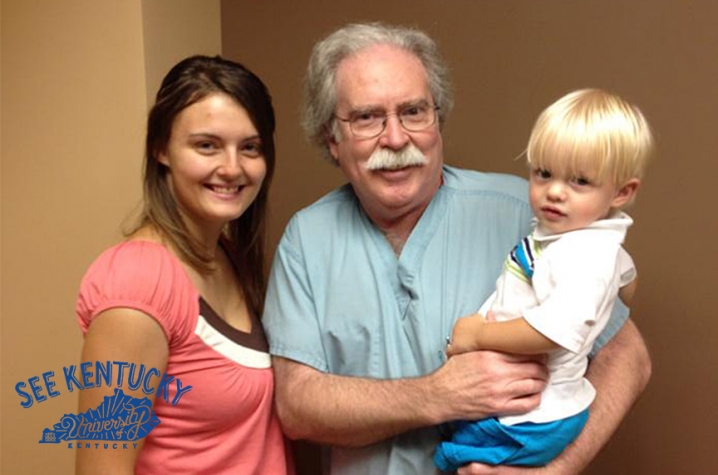UK HealthCare Obstetricians Provide Care Close to Home for Mothers in Appalachia
LEXINGTON, Ky. (Oct. 30, 2014) — Two years after her son Nicholas was born, Elma Thorpe still agrees with a phrase used to describe her baby in the first seconds of his life.
"He's perfect," Thorpe said, repeating the words of nurses who stabilized Nicholas after he was delivered by emergency caesarian section in November 2012. Today, the Breathitt County mom can't imagine life without the blond-haired child she considers a blessing. Now a toddler, Nicholas is running around the house.
But the moments before Nicholas was born were anything but perfect for Thorpe and her family. At 36 weeks pregnant, Thorpe thought pains in her stomach meant she was going into labor. After having a miscarriage with an earlier pregnancy, Thorpe was taking every precaution to ensure her baby's safety.
"I was just making sure nothing went wrong," Thorpe said.
Thorpe was admitted to the emergency department at Appalachian Regional HealthCare Medical Center in Hazard. Her regular doctor was on vacation, so on-call obstetrician Dr. James Dawson, one of two doctors based at the UK HealthCare Women's Clinic in Hazard, stepped in to deliver Thorpe's baby.
While waiting to be transferred to the labor and delivery department, Thorpe felt a gush of fluid release from her womb. She assumed the sensation was her water breaking, but the fluid was blood. When Dawson checked Thorpe's progress, he knew the amount of vaginal bleeding indicated a serious complication, and the baby needed to be delivered immediately.
"With some emergencies, you have several minutes or an hour, but this was one where we had only a few minutes," Dawson said. "We just needed to treat the problem."
Dawson's diagnosis was a placental abruption, which occurs when the placenta prematurely breaks away from the wall of the uterus. From his decades of experience delivering babies in rural Kentucky, Dawson suspected that the blood was complicated by placenta previa, a condition in which the placenta is set low on the uterus and vulnerable to separation during contractions. The abruption cut off the baby's oxygen supply, and the doctor feared that the baby would die inside the womb before he was able to deliver. He also knew Thorpe was in danger as she was losing a high volume of blood.
Dawson's first priority was removing the baby from the womb by emergency caesarian section. While working with the ARH medical team, Dawson kept Thorpe and her family calm and informed as the medical team rushed into surgery.
"He let on like nothing was wrong until it was happening and we knew it was happening," Thorpe said. "He talked to me and told me everything's going to be ok."
After Dawson delivered 5-pound Nicholas, he and the medical team focused on stopping Thorpe's bleeding. Nicholas had swallowed a small amount of blood, but was otherwise a healthy, breathing baby. Thorpe received several transfusions of blood before she was ready to go home with Nicholas. But before leaving the hospital, Thorpe and the baby took a picture with Dawson so they would remember the man who worked fast to save their lives.
"To me, he's the best doctor out there," Thorpe said of Dawson.
For some prenatal emergencies, rural patients in Appalachia are transferred by air ambulance to the UK Chandler Hospital, which has resources and teams of high-risk obstetricians and neonatologists. But today, UK HealthCare's Women's Health employs two full-time obstetricians on the ground in Hazard with the intent of keeping women closer to their home for prenatal care and delivery, even when emergencies arise. Dawson and colleague Dr. Misty Thompson provide prenatal care and gynecological services at the UK HealthCare Women's Health Clinic at the Medical Mall in Hazard. These doctors live and work in the Appalachian community where they serve.
Through a partnership between UK HealthCare and Appalachian Regional HealthCare, Dawson and Thompson are on-call for deliveries and emergencies, and provide women's health services at health departments in surrounding counties. In addition, obstetricians in Hazard who partner with UK HealthCare are granted access to the latest ultrasound technology and consultations with UK HealthCare specialists in Lexington through telemedicine.
UK HealthCare women's health providers are now based at permanent community clinics in Morehead, Georgetown and Hazard. The recently established UK HealthCare Blue Angels group of providers also extend telemedicine services to obstetricians in Manchester, Kentucky, with plans to expand their reach to providers in other Appalachian communities.
Dr. Wendy Hansen, chair of the department of Obstetrics and Gynecology at UK HealthCare, said the department offers resources and support to Appalachian providers in a collaborative effort to improve the level of care for women in every part of Kentucky. The goal is to keep women at home, bringing only the most high-risk cases to Lexington. UK HealthCare's presence in the Hazard community also helps recruit doctors to an historically underserved area that struggles to attract providers.
"It's really an effort to bring quality women's health, from contraception to pregnancy care, to that area," Hansen said. "The idea is to have a very robust obstetrics and gynecology practice."
A few months after Nicholas was born, Dawson was seeing patients at the health department in Breathitt County as part of his weekly routine. Thorpe, who was a patient at the health department, realized that Dawson traveled to the clinic every Wednesday. She left Dawson a copy of the picture she had taken with him and her the baby before leaving the hospital. She wrote a personal note on the back of the photo thanking him for saving their lives.
"That makes me energized and makes me feel good about what I do," Dawson said of the note. "That's a reward that is so special to me. I like being part of a family picture — it's what keeps me going."
MEDIA CONTACT: Elizabeth Adams, elizabethadams@uky.edu





